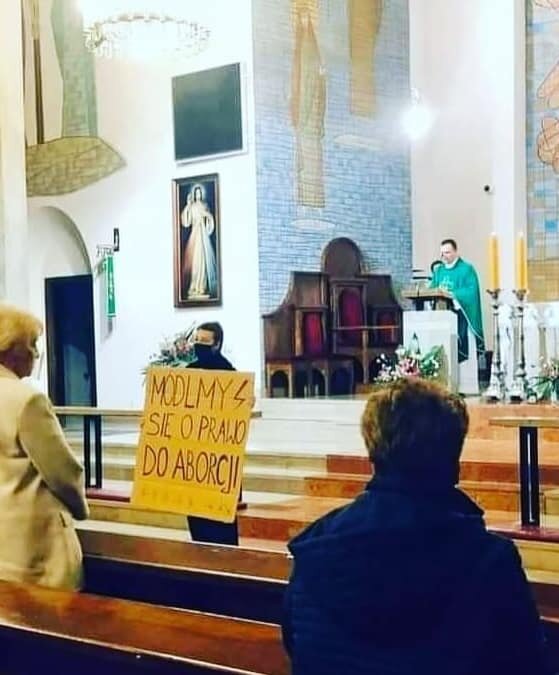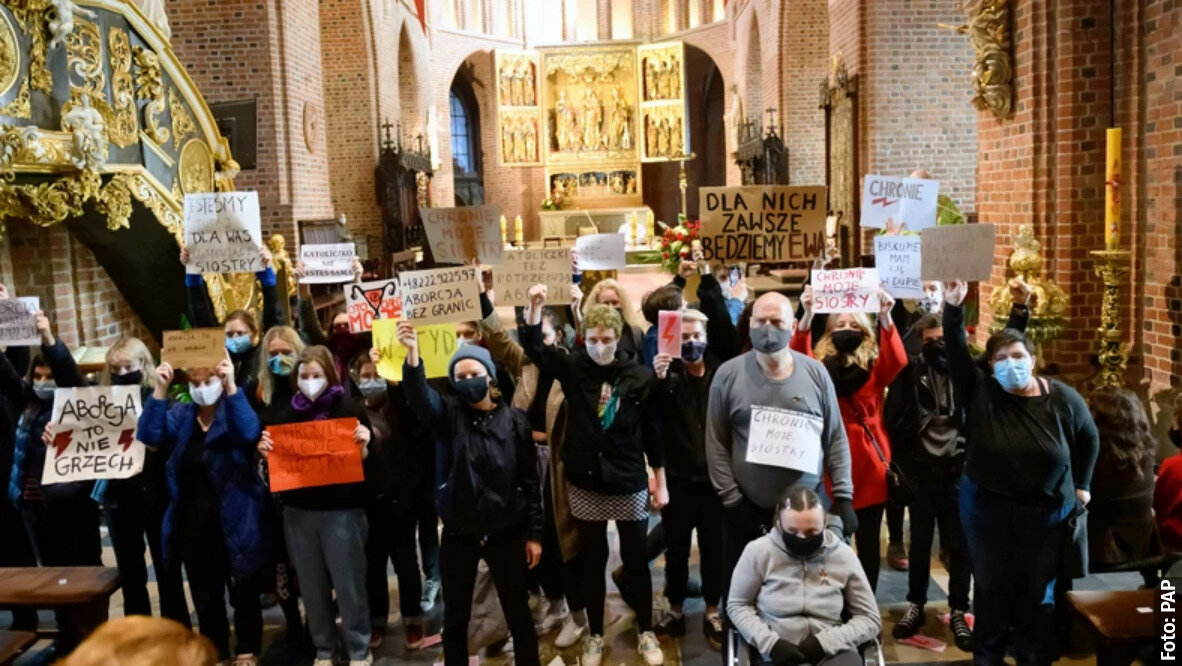No sooner had Poland’s Supreme Court ruled against aborting babies because of Down Syndrome, Cleft Palate or other disabilities, than thugs were marching to their nearest Catholic Church in retaliation for the laws.
Buoyed by inflammatory messages from the European Commissioner for Human Rights, violent mobs of anarchists marched to churches all over Poland on Sunday and committed acts of violence and intimidation. In one video, a woman can be seen trying to enter a church while a baying mob across the road scream obscenities. In another, individuals interrupt the Holy Sacrifice of the Mass inside a Catholic church and scream about wanting to abort disabled children. Various other videos include a large crowd, many of whom appear to be suffering from gender dysphoria, screaming abuse outside the house of an Archbishop.
Other images are just as shocking. Rubbish strewn outside church walls. Graffiti daubed all over doors and windows. Pope John Paul II’s statue vandalised.
These are not grassroots protests. As happened in Ireland, outside lobbies hoping to profit from abortion are funding this. In Ireland, the 2018 abortion referendum campaign saw a plethora of bizarre astro turf groups crop up over night, ‘Dogs for Abortion’ ‘Grandmothers for Abortion’ there were even ‘Sports people for abortion’ and ‘Catholics for abortion’. These were funded by outside donors in most cases, some indirectly, such as through Soros funded groups already operating within Ireland.
The good people of the world need Poland to succeed as an example to others, just as the wicked need Ireland to fall as an example to others.
Poland has some difficult years ahead of it, with EU and American influence increasingly intent upon undermining its faith and culture, but if they hold tight, those external entities are not more than 5 or 10 years away from their love of abortion and hatred of traditional morals wreaking havoc from which they will not recover. Hunker down, stay strong and keep loving live.
The great Polish Pope John Paul II wrote in Evangelium Vitae:
"God did not make death, and he does not delight in the death of the living. For he has created all things that they might exist ... God created man for incorruption, and made him in the image of his own eternity, but through the devil's envy death entered the world, and those who belong to his party experience it" (Wis 1:13-14; 2:23-24).
The Gospel of life, proclaimed in the beginning when man was created in the image of God for a destiny of full and perfect life (cf. Gen 2:7; Wis 9:2-3), is contradicted by the painful experience of death which enters the world and casts its shadow of meaninglessness over man's entire existence. Death came into the world as a result of the devil's envy (cf. Gen 3:1,4-5) and the sin of our first parents (cf. Gen 2:17, 3:17-19). And death entered it in a violent way, through the killing of Abel by his brother Cain: "And when they were in the field, Cain rose up against his brother Abel, and killed him" (Gen 4:8).
This first murder is presented with singular eloquence in a page of the Book of Genesis which has universal significance: it is a page rewritten daily, with inexorable and degrading frequency, in the book of human history.
Let us re-read together this biblical account which, despite its archaic structure and its extreme simplicity, has much to teach us.
"Now Abel was a keeper of sheep, and Cain a tiller of the ground. In the course of time Cain brought to the Lord an offering of the fruit of the ground, and Abel brought of the firstlings of his flock and of their fat portions. And the Lord had regard for Abel and his offering, but for Cain and his offering he had not regard. So Cain was very angry, and his countenance fell. The Lord said to Cain, ?Why are you angry and why has your countenance fallen? If you do well, will you not be accepted? And if you do not do well, sin is crouching at the door; its desire is for you, but you must master it'.
"Cain said to Abel his brother, ?Let us go out to the field'. And when they were in the field, Cain rose up against his brother Abel, and killed him. Then the Lord said to Cain, ?Where is Abel your brother?' He said, ?I do not know; am I my brother's keeper?' And the Lord said, ?What have you done? The voice of your brother's blood is crying to me from the ground. And now you are cursed from the ground, which has opened its mouth to receive your brother's blood from your hand. When you till the ground, it shall no longer yield to you its strength; you shall be a fugitive and a wanderer on the earth'. Cain said to the Lord, ?My punishment is greater than I can bear. Behold, you have driven me this day away from the ground; and from your face I shall be hidden; and I shall be a fugitive and a wanderer on the earth, and whoever finds me will slay me'. Then the Lord said to him, ?Not so! If any one slays Cain, vengeance shall be taken on him sevenfold'. And the Lord put a mark on Cain, lest any who came upon him should kill him. Then Cain went away from the presence of the Lord, and dwelt in the land of Nod, east of Eden" (Gen 4:2-16).
Cain was "very angry" and his countenance "fell" because "the Lord had regard for Abel and his offering" (Gen 4:4-5). The biblical text does not reveal the reason why God prefers Abel's sacrifice to Cain's. It clearly shows however that God, although preferring Abel's gift, does not interrupt his dialogue with Cain. He admonishes him, reminding him of his freedom in the face of evil: man is in no way predestined to evil. Certainly, like Adam, he is tempted by the malevolent force of sin which, like a wild beast, lies in wait at the door of his heart, ready to leap on its prey. But Cain remains free in the face of sin. He can and must overcome it: "Its desire is for you, but you must master it" (Gen 4:7).
Envy and anger have the upper hand over the Lord's warning, and so Cain attacks his own brother and kills him. As we read in the Catechism of the Catholic Church: "In the account of Abel's murder by his brother Cain, Scripture reveals the presence of anger and envy in man, consequences of original sin, from the beginning of human history. Man has become the enemy of his fellow man".
Brother kills brother. Like the first fratricide, every murder is a violation of the "spiritual" kinship uniting mankind in one great family, in which all share the same fundamental good: equal personal dignity. Not infrequently the kinship "of flesh and blood" is also violated; for example when threats to life arise within the relationship between parents and children, such as happens in abortion or when, in the wider context of family or kinship, euthanasia is encouraged or practised.
At the root of every act of violence against one's neighbour there is a concession to the "thinking" of the evil one, the one who "was a murderer from the beginning" (Jn 8:44). As the Apostle John reminds us: "For this is the message which you have heard from the beginning, that we should love one another, and not be like Cain who was of the evil one and murdered his brother" (1 Jn 3:11-12). Cain's killing of his brother at the very dawn of history is thus a sad witness of how evil spreads with amazing speed: man's revolt against God in the earthly paradise is followed by the deadly combat of man against man.
After the crime, God intervenes to avenge the one killed. Before God, who asks him about the fate of Abel, Cain, instead of showing remorse and apologizing, arrogantly eludes the question: "I do not know; am I my brother's keeper?" (Gen 4:9). "I do not know": Cain tries to cover up his crime with a lie. This was and still is the case, when all kinds of ideologies try to justify and disguise the most atrocious crimes against human beings. "Am I my brother's keeper?": Cain does not wish to think about his brother and refuses to accept the responsibility which every person has towards others. We cannot but think of today's tendency for people to refuse to accept responsibility for their brothers and sisters. Symptoms of this trend include the lack of solidarity towards society's weakest members-such as the elderly, the infirm, immigrants, children- and the indifference frequently found in relations between the world's peoples even when basic values such as survival, freedom and peace are involved.
But God cannot leave the crime unpunished: from the ground on which it has been spilt, the blood of the one murdered demands that God should render justice (cf. Gen 37:26; Is 26:21; Ez 24:7-8).




